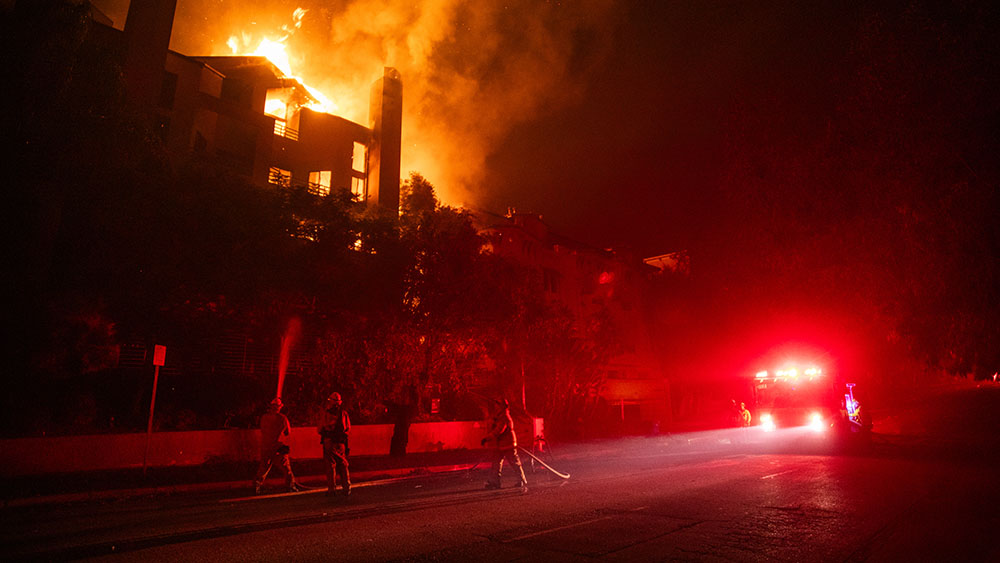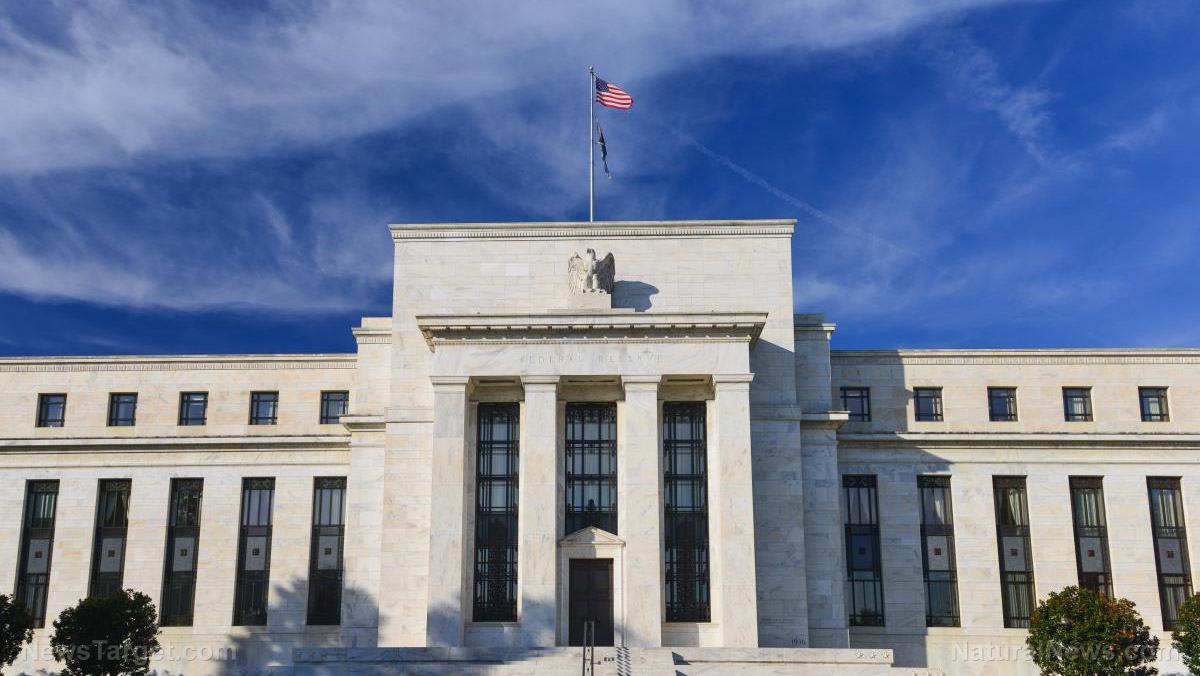California insurer’s billion-dollar ultimatum: A stark reality of wildfire risks and insurance struggles
02/17/2025 / By Willow Tohi

- FAIR Plan’s Financial Crisis: The Fair Access to Insurance Requirements (FAIR) Plan, a state-backed insurance pool for high-risk properties, has issued a demand for an additional $1 billion to cover losses from recent wildfires.
- The California State Insurance Department has approved the FAIR Plan’s request, mandating that insurers cover half the cost, with the remaining half passed on to policyholders in the form of a one-time fee. Specific fee amounts remain undisclosed, raising consumer concerns.
- Consumer groups like Consumer Watchdog are criticizing the decision, viewing it as a bailout for insurers who have dropped coverage in high-risk areas. They are exploring legal options to prevent this move, citing the need for insurers to take responsibility for their actions.
- The FAIR Plan’s struggles reflect broader issues in California’s insurance market, including insurers’ reluctance to cover high-risk properties due to wildfire risks. This has led to higher premiums and financial pressure on both insurers and policyholders.
- The $1 billion ultimatum is seen as a critical juncture for California’s insurance landscape. Policymakers must navigate the balance between ensuring insurance provider stability and protecting consumers from financial burdens, with potential long-term implications for insurance policies and costs in the state.
In a move that has sparked controversy and concern, California’s insurance provider for high-risk properties, the Fair Access to Insurance Requirements (FAIR) Plan, has issued a stark ultimatum: give us $1 billion more, or we won’t pay out for the devastating Los Angeles wildfires. This demand highlights the growing challenges faced by California in managing the financial aftermath of increasingly frequent and severe natural disasters.
The FAIR Plan’s financial crisis
The FAIR Plan, a state-backed insurance pool, has become a critical lifeline for homeowners who are denied private coverage due to the high risk of wildfires. As of 2024, the plan had issued over 452,000 policies, more than double the number in 2020. The dramatic increase in policyholders reflects the growing reluctance of major insurers to cover properties in high-risk areas, a trend exacerbated by the escalating frequency and intensity of wildfires in California.
The recent Eaton and Palisades Fires, which ignited on Jan. 7, have had a catastrophic impact, destroying nearly 17,000 structures and claiming at least 29 lives. The FAIR Plan is bracing for a staggering $4 billion loss, with over 4,700 claims already filed and more than 914 million paid out as of this week. To meet these financial obligations, the FAIR Plan has requested an additional $1 billion, a move that has not been seen in over 30 years.
Divisive solutions and consumer concerns
On Tuesday, the State Insurance Department approved the FAIR Plan’s request, stipulating that all insurers operating in California must bear half the cost. The remaining half will be passed on to policyholders in the form of a one-time fee, which insurers can collect over the next two years. However, the specifics of the fee amount have not been disclosed, leaving many policyholders in the dark about the financial impact.
State Insurance Commissioner Ricardo Lara defended the decision, stating, “I took this necessary consumer protection action with one goal in mind: the FAIR Plan must pay claims just like any other insurance company. I reject those who are hoping for the failure of our insurance market by spreading fear and doubt. Wildfire survivors can’t cash ‘what ifs’ to pay for food and rent, but they can cash FAIR Plan checks.”
Despite Lara’s assurances, consumer advocates are sounding the alarm. Carmen Balber, executive director of Consumer Watchdog, a watchdog group, slammed the decision, asserting, “The FAIR Plan is in trouble because insurance companies dumped too many homeowners. That’s why insurers are on the hook for FAIR Plan losses. Consumer Watchdog is exploring every legal option to stop a bailout if any insurance company seeks to make consumers pay.”
The broader implications
The FAIR Plan’s financial struggles are a symptom of a larger, systemic issue in California’s insurance market. Over the past few years, several major insurance companies have either paused or restricted new business in the state, citing the increased risk of wildfires due to a lack of proactive policies and climate change. This has pushed hundreds of thousands of homeowners onto the FAIR Plan, which was never intended to be a long-term solution.
Mark Sektnan of the American Property Casualty Insurance Association (APCIA) emphasized the importance of the state’s decision, saying, “This is essential to prevent even greater strain on California’s already unbalanced insurance market and avoiding widespread policy cancellations that would jeopardize coverage for millions of Californians.”
Historical context and the path forward
The current crisis is rooted in the state’s history of grappling with natural disasters, particularly wildfires. Of the top 20 most destructive wildfires in California’s history, 15 have occurred since 2015, a clear indication of the growing threat posed by liberal leadership’s poor management. In response, the state has implemented regulations that allow insurers more flexibility in setting premiums, including the consideration of climate change risks.
However, these measures have also led to higher costs for consumers. The passage of these costs to policyholders through the FAIR Plan’s request is a contentious issue, highlighting the delicate balance between ensuring financial stability for insurance providers and protecting consumers from undue financial burden.
As California continues to face the dual challenges of wildfires and insurance market instability, the state’s policymakers and stakeholders must find a sustainable solution that protects both homeowners and the insurance industry. The $1 billion ultimatum is a critical juncture, and the response to it will set the tone for the future of insurance in California.
For now, the focus remains on supporting the survivors of the Los Angeles wildfires and ensuring that the FAIR Plan can meet its obligations. The broader implications of this decision will likely reverberate through the state’s insurance landscape for years to come.
Sources include:
Submit a correction >>
Tagged Under:
california collapse, chaos, climate, Collapse, Collapsifornia, debt bomb, debt collapse, disaster, environ, FAIR Plan, government debt, insurance, outrage, poor management, tragedy, wildfires
This article may contain statements that reflect the opinion of the author
RECENT NEWS & ARTICLES
COPYRIGHT © 2017 BUBBLE NEWS



















